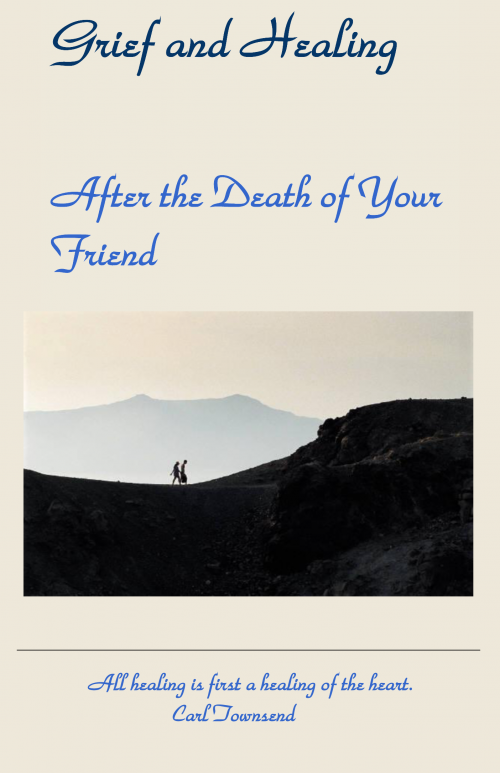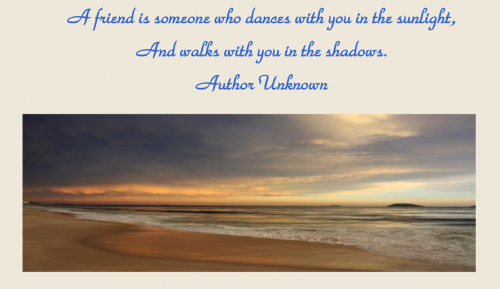
Often people think of grief is related only to the death of a family member. Folks can be less aware of the grief that results from the death of a friend. Yet the bond between friends can be stronger than some family connections. We choose our friends. We put effort into maintaining our friendships. Friends usually share interests and develop a common history based on companionship. Friend is a voluntary position that only lasts when both friends expend time and energy to keep it going. The loss of a friend through death is a deep loss. Someone may say, “She was only a friend...” that is, not a relative. You know that you and your friend were as close as two people can be in this life.

You might think that grief varies based on who died. In fact, the pain of grief is usually 100% when anyone we love dies. There are different kinds of adjustments needed to cope with different losses. The sorrow over a friend’s death is likely to be as intense as the loss of a family member. However, your loss and your grief may not be fully recognized. There’s no bereavement leave for the death of a friend. Often friends aren’t involved in planning for funeral or memorial services. You may be asked to speak or contribute in some way. You might be a pallbearer. You might stand by to support your friend’s family members, spouse, children. Then you may feel you’ve been left alone with a grief not quite rising to the level expected of a family member. Yet your grief is probably every bit as painful.

Grief heals as people give attention to their feelings of sorrow and loss. Grief is about missing someone who has had an important part in your life. As friends, you chose to be close. You bonded over some common experience, you built a history over years of sharing and supporting one another. You witnessed each other’s trials and triumphs. Friendships often endure separation over time and distance, only to be renewed fully when you have a chance to re-connect.
You and your friend shared times and words no one else knows about. Remembering those things known only by the two of you helps you with the sadness of loss by adding to your gratitude for what you had in common. A close friend is a gift. Most of us only have a few truly close friends in a lifetime. Memories that bring smiles and tears remind one how vital the friend’s life has been in one’s own life story. Your life has been different – better – because of your friendship and your friendship will continue to influence your life from now on. You may find yourself telling the story of your friendship in words spoken to supportive people, in writing or in other creative expressions and in the inner talk we all use to gain perspective and appreciation for the most precious parts of our lives.

The death of a friend means the loss of a witness to the times you shared together. Friends remind us of where we’ve been, what we’ve done, even who we are. Losing a friend brings the sadness that the memories are now yours alone and that the one person who most appreciated those memories can no longer share them with you.
Unfortunately, people may not acknowledge how deeply you feel the grief brought on by the death of a friend. You may even be surprised by the extent of your grief. Grief is the process of mourning the loss and adjusting to the reality of life without the person you loved. A friend’s death, no less than any other, brings on grief that will take time, endurance and effort to heal.
Grief is normal and natural. Grief goes with loving. When you love someone, you hurt when that person dies. In a way, it is a cost of loving. Sometimes people wonder, when they are stricken with the deepest pain of loss, if it was a mistake to love so much. When asked, “Would you have had it any other way?” the answer is always, “No!”

Since you have read this far, you probably are affected by your grief deeply enough to want to do something about it. What might you do that would help you go through this time of grieving?
Here are a few ideas that have proven helpful to many people:
*Use your resources. Reach out for support from family, friends, members of your faith community - anyone who is part of your network of relationships. If you have established patterns, routines or rituals of spiritual, emotional and physical health, use them to deal with the current state of your life. Praying, journaling, working out and other activities can be valuable aids to both endurance and healing when you are grieving.
*Find new resources. There are all kinds of printed materials to provide information, inspiration and direction that can help grieving people. Ask around, visit a bookstore or library, go online. Look for titles and descriptions that speak to you. There are many grief-related connections online, including websites, articles, chats and blogs, as well as links to local support providers.
*Seek community or professional support. Hospices, funeral homes, religious communities and other organizations provide support groups, informational meetings, classes and counseling for grievers. Grief counselors, mental health therapists, spiritual leaders, chaplains and others can provide individual help as you work through your grief experiences.


